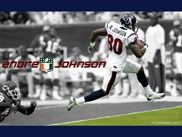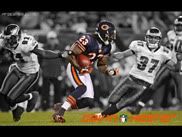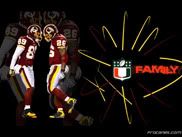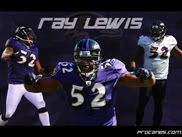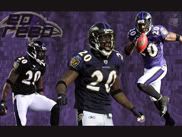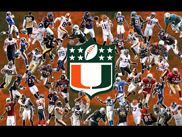CLICK HERE TO ORDER!
A Back on Track - Redskins' Portis Is Working Hard to Stay Healthy and Stay Focused
Jun/10/08 02:01 PM Filed in: Clinton
Portis

Portis, entering his seventh NFL season and fifth with the Redskins, is taking a more mature and healthy approach to his preparation, he says, at the behest of team owner Daniel Snyder and Vinny Cerrato, the vice president of football operations. Snyder and Cerrato provided another apparent impetus in the form of a lucrative new contract for Portis -- despite his injury and conditioning issues the past two years -- essentially guaranteeing his contract through 2010, a rarity in a league of non-guaranteed contracts.
The deal with Portis, the fourth-leading rusher in franchise history, was one of several restructured contracts the Redskins executed to get under the NFL salary cap, and by far the most significant. Portis ended up with a $9.3 million signing bonus in March, and a guarantee of at least $15.7 million through 2010, creating millions in salary cap space but also binding Washington to a player who has been both adored and criticized here and has averaged just 4.0 yards per carry as a Redskin, below the NFL average.
Portis, 26, played down any link between his latest payday (the Redskins have reworked his contract each of the last three years) and his improved work ethic, but even he was pleasantly surprised by the turn of events. Portis wondered aloud last season whether 2007 would be his final year in Washington -- with his ailments and big salary cap number conspiring against him -- but instead management showed faith in him.
"You want to make it a money thing, but it's what they think of me" that matters, Portis said recently. "I'm grateful to have the opportunity because they didn't have to do that. I was never worried about not being able to play; I was just worried about being in D.C. But I'm here now, and you've got three more years of talking to me."
Portis has been a mainstay of the offseason workout program since March, keeping to a proper diet and working out in the weight room like never before after spending much of the last two seasons trying to overcome injuries and a tendency to become winded. Some days he has trained with linemen, pushing a sled weighed down by teammates, and he is looking more chiseled. He had been at Redskins Park essentially every working day before last Thursday, when Coach Jim Zorn excused him indefinitely. Zorn said he had no problems with Portis leaving to attend what Zorn said was "a celebration" and has praised Portis's work ethic.
"It wasn't [the new contract], it's just he simple fact that I'm now six years in," said Portis, who still has a distaste for practice in general. "How many good years do I got left? This is a golden opportunity, why let it slip away? They asked me to be here; I might as well be here. And I'm here, so I might as well work and take advantage of the opportunity.
"I feel much better. As much as I didn't want to be here [in the offseason], to go out there and be able to run downfield 100 yards and jog back and turn around and run 100 yards again [without being fatigued], it feels great."
Along with Snyder and former coach Joe Gibbs, Cerrato, who declined to comment for this story, embraced Portis's outsized personality and outlandish ways; Portis dressed in costume to meet the media for much of the 2005 season. Management has staunchly defended his production throughout his Redskins career, but some fans, teammates and coaches have been less enthused about Portis's style.
He remains a polarizing figure, piling up yardage but being inconsistent at times and failing to approach the success he had in Denver, where he played for two years before the Redskins traded cornerback Champ Bailey plus a second-round pick for him. His body of work as a Redskin, like his persona, is akin to abstract art -- open to interpretation.
Portis averaged 5.5 yards per carry and 107 yards per game as a Bronco, scoring 29 rushing touchdowns in 29 contests. With the Redskins he has averaged just 4.0 yards per carry and 84 yards per game, scoring 34 rushing touchdowns in 55 games. In 2005 Portis led a playoff run and set a franchise record with 1,516 yards on the ground, but, a year later, could only watch as Ladell Betts topped 1,000 yards in half a season with Portis injured.
Portis slumped through the first half of 2007 (he went 12 games between 100-yard games dating from 2006), coming back from injury and playing behind a makeshift offensive line at times, but still finished with 1,262 yards, sixth most in the league, though he averaged less than four yards per carry. Only six backs have more rushing yards than Portis since 2004, but one, Tiki Barber, has been retired since 2006, and Thomas Jones of the Jets has amassed four fewer yards than Portis in that span while earning a fraction of what Portis has.
Portis can be as selfless as any runner in the NFL, sacrificing his body in pass protection, but his practice habits and comments have turned off some within the organization, too.
Portis will have earned $37.6 million from Snyder by the end of the 2008 season (though some of that money is deferred), and Washington's repeated reworking of his deals has irked some teammates, who feel he gets preferential treatment. During the past four years it was not uncommon for teammates to complain to coaches about what they perceived to be a double standard for Portis, sources said.
"A lot of things Clinton does rub people the wrong way, but Joe Gibbs looked the other way on all of that," said one former member of the organization. "Joe would always talk to the team about being totally focused on football during practice -- he didn't want guys talking about movies or what they did last night; even if you were hurt you were taking mental reps -- that was something he really harped on. But then you look over [during practice] and there's Clinton over there having fun with Vinny and Dan. How's that totally focused on football?"
His input and apparent sway in personnel matters has raised the ire of some as well; Portis regularly expressed his opinion on possible free agents and draft picks to Gibbs and management and often jokes about being an assistant general manager of sorts.
Portis often broke from the prescribed dress code during practices and games and usually was the last person to arrive for a team meeting, players and coaches said. While the general rule was for players to report and do rehabilitation before morning meetings, he would arrive just in time, then others had to scramble in order to accommodate his rehab in the afternoon. Portis regularly would be allowed to miss much of practice but was not listed on the injury report, players and coaches said, fueling his reputation as a player who did not take practice seriously.
"He's getting a little older, and he knows that," said wide receiver Santana Moss, a close friend who also played at the University of Miami.
"Regardless of what Clinton does he comes out and plays ball, but he's showing everybody he's not the guy everybody thinks he is when it comes to how he handles his offseason training and how he prepares.
"He knows he gets a lot of BS on why he's not here or what he's doing when he's not here, but I ain't never seen Clinton when it comes to game time that he didn't go out there and perform. He's just showing you now, 'Hey, if you want me here I'm gonna be here.' "
With a new coaching regime in place, many of Gibbs's tenets no longer apply, including an arrangement that allowed Portis to take himself out of games, and to make way for Betts whenever he felt it necessary.
"I don't think that's something that's going to happen here," Zorn said. "That's not the way our offense is designed. I don't think that will be the way that we function on the football field."
Portis averaged nearly 350 carries per season in his first two years under Gibbs, and, while the pounding takes a toll on running backs, he will play a critical role, particularly early this season, as the quarterbacks and receivers adjust to a new offense.
"He has a great feel for the zone running game," Zorn said. "I did not change the run game from what has been run here in the past. He ought to feel very comfortable with what we are doing."
(washingtonpost.com)


